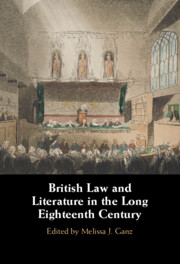Refine search
Actions for selected content:
624 results
Introduction
-
-
- Book:
- Science and Humanism
- Published online:
- 09 October 2025
- Print publication:
- 23 October 2025, pp 1-8
-
- Chapter
-
- You have access
- Open access
- HTML
- Export citation

Science and Humanism
- Knowledge, Values, and the Common Good
-
- Published online:
- 09 October 2025
- Print publication:
- 23 October 2025
-
- Book
-
- You have access
- Open access
- Export citation
Introduction
-
-
- Book:
- British Law and Literature in the Long Eighteenth Century
- Published online:
- 19 September 2025
- Print publication:
- 09 October 2025, pp 1-24
-
- Chapter
- Export citation
Chapter 8 - Common Law and Cultural Difference in Scott’s Ivanhoe and Chronicles of the Canongate
-
-
- Book:
- British Law and Literature in the Long Eighteenth Century
- Published online:
- 19 September 2025
- Print publication:
- 09 October 2025, pp 167-186
-
- Chapter
- Export citation
1 - The Intransigence of Racial Injustice in American Land Use 100+ Years After Buchanan v. Warley
-
-
- Book:
- Racial Justice in American Land Use
- Published online:
- 19 September 2025
- Print publication:
- 09 October 2025, pp 1-43
-
- Chapter
- Export citation
Fairness, justice, and criticality: Reviewing second language writing assessment
-
- Journal:
- Language Teaching , First View
- Published online by Cambridge University Press:
- 29 September 2025, pp. 1-28
-
- Article
-
- You have access
- Open access
- HTML
- Export citation
11 - “A Dead Child Is Better than a Missing One”
-
-
- Book:
- Reckoning with Law in Excess
- Published online:
- 09 September 2025
- Print publication:
- 25 September 2025, pp 258-294
-
- Chapter
-
- You have access
- Open access
- HTML
- Export citation

British Law and Literature in the Long Eighteenth Century
-
- Published online:
- 19 September 2025
- Print publication:
- 09 October 2025
DSM and ICD classifications in medico-legal reporting: misperceptions, misunderstandings and misuse
-
- Journal:
- BJPsych Advances , FirstView
- Published online by Cambridge University Press:
- 15 September 2025, pp. 1-13
-
- Article
-
- You have access
- Open access
- HTML
- Export citation
Is justice served by reliance on ICD and DSM classifications of mental disorder in medico-legal reporting?
-
- Journal:
- BJPsych Advances , FirstView
- Published online by Cambridge University Press:
- 15 September 2025, pp. 1-11
-
- Article
-
- You have access
- Open access
- HTML
- Export citation
Postface
-
- Book:
- Performing Justice in the Later Roman Empire
- Published online:
- 07 August 2025
- Print publication:
- 21 August 2025, pp 114-117
-
- Chapter
- Export citation
17 - Conclusions for Stability and Re/politicization in Climate Governance
- from Part V - Reflections
-
-
- Book:
- Stability and Politicization in Climate Governance
- Published online:
- 07 August 2025
- Print publication:
- 21 August 2025, pp 254-266
-
- Chapter
-
- You have access
- Open access
- HTML
- Export citation
Chapter 1 - Introduction
-
- Book:
- Performing Justice in the Later Roman Empire
- Published online:
- 07 August 2025
- Print publication:
- 21 August 2025, pp 1-25
-
- Chapter
- Export citation
1 - Introduction
-
-
- Book:
- Stability and Politicization in Climate Governance
- Published online:
- 07 August 2025
- Print publication:
- 21 August 2025, pp 1-16
-
- Chapter
-
- You have access
- Open access
- HTML
- Export citation
Chapter 2 - Petitions
-
- Book:
- Performing Justice in the Later Roman Empire
- Published online:
- 07 August 2025
- Print publication:
- 21 August 2025, pp 26-50
-
- Chapter
- Export citation
4 - “When You Think about Climate Change, It Is a Social Justice Issue”
- from Part I - Movement Politics
-
-
- Book:
- Stability and Politicization in Climate Governance
- Published online:
- 07 August 2025
- Print publication:
- 21 August 2025, pp 49-62
-
- Chapter
-
- You have access
- Open access
- HTML
- Export citation
From Individual Virtue to the Just State: Cicero and the Legal Nature of Roman Political Thought
-
- Journal:
- The Journal of Roman Studies , First View
- Published online by Cambridge University Press:
- 15 August 2025, pp. 1-19
-
- Article
-
- You have access
- Open access
- HTML
- Export citation
Chapter 9 - A Sense of Duty
- from Part IV - Virtues of Indirect Caring
-
- Book:
- Attention to Virtues
- Published online:
- 25 July 2025
- Print publication:
- 14 August 2025, pp 216-237
-
- Chapter
- Export citation
9 - Alternative Approaches in Law and Policy
-
- Book:
- Appearance, Disability and the Law
- Published online:
- 31 July 2025
- Print publication:
- 14 August 2025, pp 127-156
-
- Chapter
- Export citation
Chapter 2 - Leibniz
-
- Book:
- Freedom and Perfection
- Published online:
- 25 July 2025
- Print publication:
- 14 August 2025, pp 29-57
-
- Chapter
- Export citation
